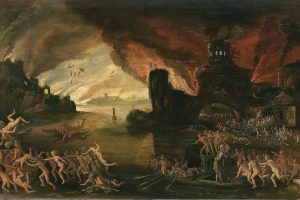In the 11th century, St. Anselm of Canterbury described theology as fides quaerens intellectum, “faith seeking understanding.” A monk who eventually served as archbishop of Canterbury, he reminds us that our thinking skills are a gift of the Creator; there is no reason to neglect them in matters of faith.
For Anselm, theology presumes faith. In other words, theology is an exercise of faith, a way of being faithful, and a way of living one’s faith. It is not synonymous with catechesis, which is passing on or instructing others in faith. This is because one who does theology has presumably already been catechized and convinced of the truth of Christian faith.
The Greek origins of our word “theology” seem to remind us of this: theos (“God”) and logos (“word”). In the fullest sense, perhaps theology can best be understood as the act of thinking deeply about the God we profess. Thinking critically about God, therefore, really means to take God quite seriously.
When combined with the critical assessment of doctrine, such thinking can sometimes place theologians into metaphoric “hot water” with the hierarchy of the church. This tension seems inevitable if we understand the respective jobs of the bishop (chief catechist) and the theologian (critical assessor). They are two very distinct, yet interrelated vocations, and each needs the other.
In fact, theologians were traditionally understood as an important part of the church’s teaching authority. St. Thomas Aquinas went so far as to speak of two “chairs” of ecclesiastical authority: the pastoral chair of the ordained, and the teaching chair held by theologians. It would be a healthy development to see this perspective reclaimed and reinvigorated so that theologians who are in tension with church hierarchy receive a fair hearing today.
Although a professional theologian makes a career out of doing theology (usually in colleges and universities), all believers spend a certain amount of time theologizing whenever we ponder the great questions of life’s meaning within the context of faith. The Benedictine monk and missionary Bede Griffiths is reported to have said that anytime we pray, we are doing theology.
All theologizing is not of equal value, however, and it is the job of the professional theologian to help the church critically assess whether our theological notions are faithful to the gospels—and whether or not they spur us to live that gospel in our daily lives.
This article appeared in the May 2010 issue of U.S. Catholic (Vol. 75, No. 5, page 46).
Image credit: Unsplash
Have a question you’d like get answered? Ask us at editors@uscatholic.org and we’ll look into it for you!













Add comment